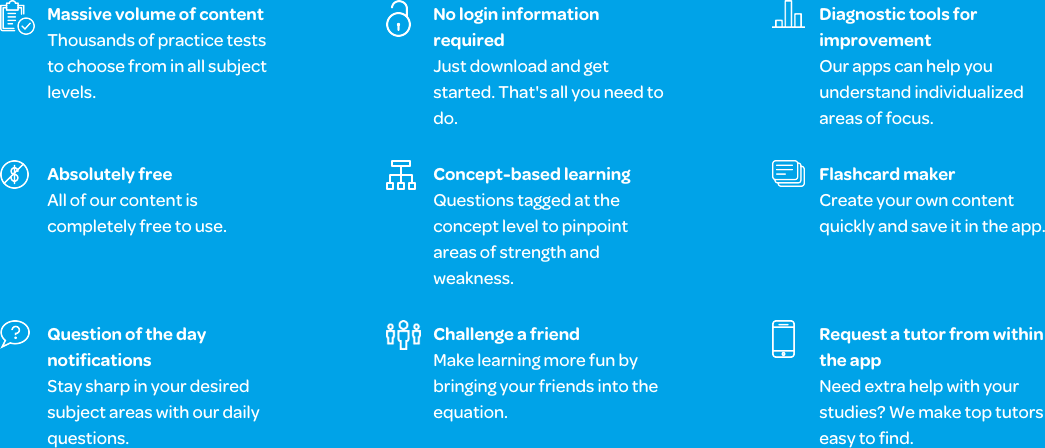The Varsity Tutors AP Psychology Mobile App
Advanced Placement (AP) Psychology is a course designed to introduce you to the study of behavioral and mental processes. These are primarily applied to mammals like primates and humans. Throughout the course, you are taught the basic concepts needed to progress into more advanced psychology courses in college. As an upper-level course, it is ideal to be as proactive as possible to give you the best chance to achieve success during the class. There are plentiful supplemental study materials available through the free Varsity Tutors AP Psychology app, available from iTunes and the Google Play Store for both Apple and Android devices. The app is free, fast, and provides ample opportunities for practicing your psychology knowledge using a variety of tools.
Throughout the school year, students in AP Psychology spend a majority of their time preparing for the exam in May. The exam is designed to assess your knowledge, and your score may grant you college credit at some institutions. On the app, you will find a wide range of materials that can help you study for the test. The app uses information from past tests, exams, and quizzes. The information the app provides can help to identify your strengths and weaknesses, which can help you raise the overall quality of your study time by helping you focus on only the topics you need to review.
Through the app, you can access a wide range of professionally-created study materials, such as concept-specific reviews, full-length practice tests, flashcards, and more. You’ll encounter materials that cover cognition and learning, the history of psychology, states of consciousness, developmental and abnormal psychology, and biological behaviors. AP Psychology students can take advantage of these tools to prepare for the rigorous exam at the end of the year, as well as for any tests along the way.
Flashcards are great for quick study sessions. You have the option of creating your own customized flashcard set to focus your studies on more difficult concepts, or use the hundreds of flashcards available in the app’s library. You can choose to view flashcards from specific areas, or set the app to randomly quiz you on various concepts. If you need to review individual psychology and behavior, motivations, social psychology, or other specific areas of AP Psychology, concept-specific review is available at the touch of your finger.
Concept-specific and full-length practice tests are available to help you assess your preparation for the real exam. They are timed to help you ensure that you will be able to complete the real test in plenty of time. The tests pull from topics covered on past exams to ensure that the app provides relevant questions. Upon completing each test, you’ll receive a full review of your results. The test results provide a range of useful information, such as your percentile and the concepts you need to improve on, to help you determine where to focus your studies.
With Varsity Tutors’ AP Psychology application, you can study the concepts you find challenging anytime, anywhere. Download the AP Psychology mobile app from iTunes or the Google Play Store today to get started.
66 mobile apps to choose from for your tutoring needs.

Learn More
If you are a high school student who is interested in majoring in an area of social science, or if you are interested in becoming a psychologist, then the AP Psychology course might be a perfect fit for you. This course is administered by The College Board, and is an excellent way to improve your chances of acceptance into a psychology program at a top university. Moreover, by completing the course you could receive college credits or satisfy a course prerequisite, depending on the institution.
The AP Psychology course serves as a college-level introduction to psychology. Here, you will learn about the various schools of psychology, famous psychologists and psychiatrists, and how to use proper research methods while analyzing human behavior. As you work to complete this course, you will learn how biology and culture influence human behavior.
When you take the AP Psychology exam, you will have two hours to complete the test, which is divided into two portions. The first section is comprised of 100 multiple-choice questions that cover the history of psychology, research methodology, cognition, emotions, personalities, and a variety of psychological schools. For the second portion of the test, you will have 50 minutes to answer two free-response questions. This writing portion will test your knowledge on a number of psychological theories and perspectives, and you will be required to identify and describe a variety of concepts within the discipline.
The AP Psychology course covers the field from its roots in Ancient Greece, where philosophers would study human behavior and the mind, to psychology in its modern capacity. As you become acquainted with psychology, you will learn about Wilhelm Wundt, who established the first psychology laboratory in 1879, and Sigmund Freud, the father of psychoanalytical psychology. You will also learn about how psychology is viewed as a science that carefully follows the scientific method. As you learn more about psychology’s roots, you will be introduced to the four main psychological approaches: the biological approach, the psychodynamic approach, the behavioral approach, and the cognitive approach.
Early psychology had two prominent schools of thought: structuralism and functionalism. Structuralism was a school of psychology that emerged from Europe and was commonly associated with Wilhelm Wundt. Structuralism argued that the best way to learn about the brain and understand the mind is to break it down into basic elements. Functionalism, on the other hand, was a school of thought that came out of the United States as a reaction to Wundt’s theory. Functionalism argued that studying consciousness will lead to a greater understanding of human behavior than focusing on the mind’s structure.
As you explore the history of psychology, you will learn more about various influential schools that developed it. These schools of thought include Gestalt, psychoanalysis, and behaviorism. You will also learn about important researchers, like Sigmund Freud, Carl Jung, and B.F. Skinner.
An important component of psychology is research. You will be required to understand the basics of quantitative and qualitative research. In AP Psychology, you will learn about statistics, research designs, and how to interpret data. You will also learn the ethics behind psychological experiments, as well as learn about some experiments that violated ethical code, such as Philip Zimbardo’s “Stanford Prison Experiment.”
The AP Psychology course also covers educational psychology and how we evaluate intelligence. You will learn about various intelligence testing models, the “Multiple Intelligences” theory, and how nature and nurture can influence one’s IQ. Another important aspect of the course is biopsychology. You will learn about the various parts of the brain and what function each part serves. You will also learn about neurotransmitters, your body’s neural network, and the concept of neuroplasticity.
While learning about the biology inherent in psychology, you will be introduced to our five senses and how they are relevant to the field. You will learn about sensory mechanisms and receptors, and how external stimuli can influence your senses. Moreover, you will learn about developmental psychologists like Jean Piaget and others, who researched depth perception and senses in young children.
Other important areas covered in the course are memory, cognition, and other states of consciousness. You will explore the theories behind dreams, hypnosis and meditation, and altered states of consciousness brought on through psychoactive drug use. You will also learn about how all of these mental states affect cognition, memory, and perception. Additionally, you will learn about short- and long-term memory, as well as how certain head injuries can affect one’s memory.
As you revisit behaviorism, you will learn about classical and operant conditioning. You will learn about Pavlov’s experiment with dogs, as well as John Watson’s controversial experiment with Little Albert, where he used classical conditioning to explore the feeling of fear in babies. You will also learn about the “Garcia Effect” and our evolutionary adaptation of taste aversion.
In this course you will also briefly touch on abnormal psychology, and learn about the history of the “Diagnostic and Statistical Manual of Mental Disorders.” You will learn about various disorders, ranging from schizophrenia to depression, and well as other interesting personality disorders. You also will be introduced to a variety of approaches to treat mental illness, including the psychoanalytic and humanistic approaches. Moreover, you will learn about psychiatric drugs and various types of therapy, like biological therapy, group therapy, and individual therapy.
Social psychology is another important aspect of AP Psychology. In this section, group behavior and mob mentality are covered. You will learn about a number of cases, such as the Kitty Genovese incident and the bystander effect. Other important aspects include attitudes, authority and obedience, conformity, aggression, and stereotypes.
Upon completing this course, you should have a deeper understanding of human behavior, as well as a foundation of mental processes in people and various animals. Additionally, you should have a basic understanding of statistics, the scientific method, and clinical research. In order to successfully complete the course, you will need to be able to describe various psychological schools of thought, apply concepts from popular theories into real-world scenarios, and analyze and critique research articles.




